had better do sth最好做某事
- 格式:doc
- 大小:30.00 KB
- 文档页数:2
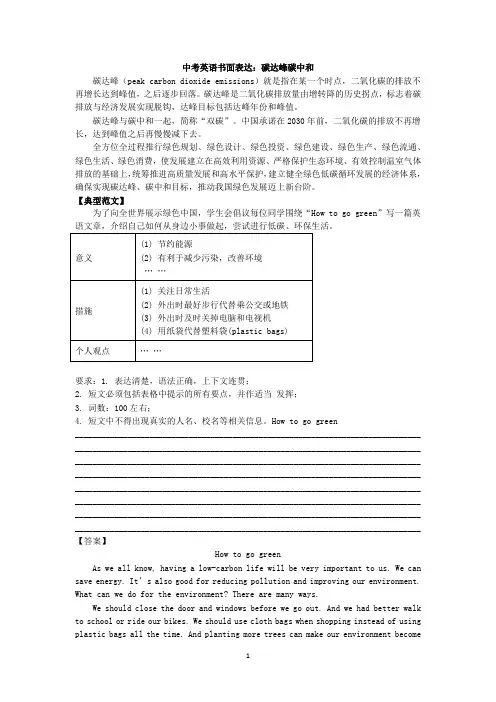
中考英语书面表达:碳达峰碳中和碳达峰(peak carbon dioxide emissions)就是指在某一个时点,二氧化碳的排放不再增长达到峰值,之后逐步回落。
碳达峰是二氧化碳排放量由增转降的历史拐点,标志着碳排放与经济发展实现脱钩,达峰目标包括达峰年份和峰值。
碳达峰与碳中和一起,简称“双碳”。
中国承诺在2030年前,二氧化碳的排放不再增长,达到峰值之后再慢慢减下去。
全方位全过程推行绿色规划、绿色设计、绿色投资、绿色建设、绿色生产、绿色流通、绿色生活、绿色消费,使发展建立在高效利用资源、严格保护生态环境、有效控制温室气体排放的基础上,统筹推进高质量发展和高水平保护,建立健全绿色低碳循环发展的经济体系,确保实现碳达峰、碳中和目标,推动我国绿色发展迈上新台阶。
【典型范文】为了向全世界展示绿色中国,学生会倡议每位同学围绕“How to go green”写一篇英语文章,介绍自己如何从身边小事做起,尝试进行低碳、环保生活。
要求:1. 表达清楚,语法正确,上下文连贯;2. 短文必须包括表格中提示的所有要点,并作适当发挥;3. 词数:100左右;4. 短文中不得出现真实的人名、校名等相关信息。
How to go green_______________________________________________________________________________ _______________________________________________________________________________ _______________________________________________________________________________ _______________________________________________________________________________ _______________________________________________________________________________ _______________________________________________________________________________ _______________________________________________________________________________ _______________________________________________________________________________【答案】How to go greenAs we all know, having a low-carbon life will be very important to us. We can save energy. It’s also good for reducing pollution and improving our environment. What can we do for the environment? There are many ways.We should close the door and windows before we go out. And we had better walk to school or ride our bikes. We should use cloth bags when shopping instead of using plastic bags all the time. And planting more trees can make our environment becomebetter. We should turn off the lights, the TV and the computer when we leave the classroom. When we go out, we had better walk instead of taking a bus or car. What’s more, it’s a good idea to reuse the books as possible as we can.In fact, if everyone does something for the environment, I believe the earth will be a better place. And our world will be more beautiful.1.题干解读:本文是一篇话题作文。
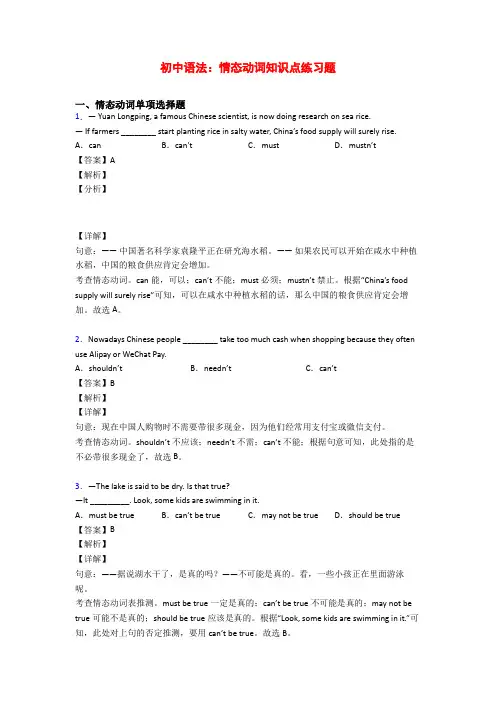
初中语法:情态动词知识点练习题一、情态动词单项选择题1.— Yuan Longping, a famous Chinese scientist, is now doing research on sea rice.—If farmers ________ start planting rice in salty water, China’s food supply will surely rise. A.can B.can’t C.must D.mustn’t【答案】A【解析】【分析】【详解】句意:——中国著名科学家袁隆平正在研究海水稻。
——如果农民可以开始在咸水中种植水稻,中国的粮食供应肯定会增加。
考查情态动词。
can能,可以;can’t不能;must必须;mustn’t禁止。
根据“China’s food supply will surely rise”可知,可以在咸水中种植水稻的话,那么中国的粮食供应肯定会增加。
故选A。
2.Nowadays Chinese people ________ take too much cash when shopping because they often use Alipay or WeChat Pay.A.shouldn’t B.needn’t C.can’t【答案】B【解析】【详解】句意:现在中国人购物时不需要带很多现金,因为他们经常用支付宝或微信支付。
考查情态动词。
shouldn’t不应该;needn’t不需;can’t不能;根据句意可知,此处指的是不必带很多现金了,故选B。
3.—The lake is said to be dry. Is that true?—It _________. Look, some kids are swimming in it.A.must be true B.can’t be true C.may not be true D.should be true 【答案】B【解析】【详解】句意:——据说湖水干了,是真的吗?——不可能是真的。
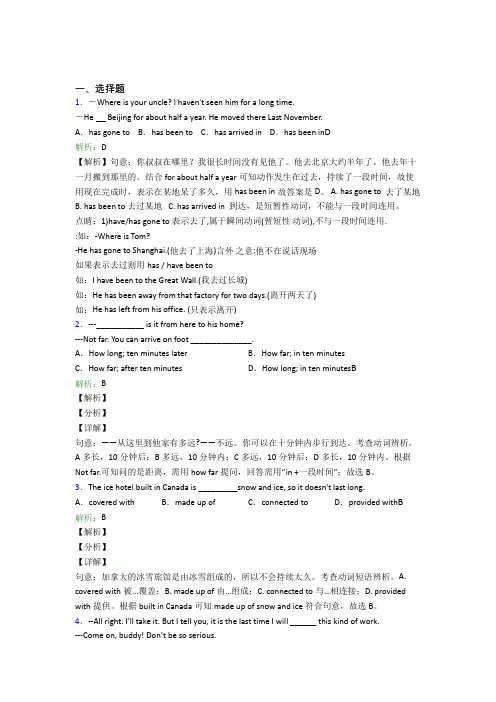
一、选择题1.-Where is your uncle? I haven't seen him for a long time.-He Beijing for about half a year. He moved there Last November.A.has gone to B.has been to C.has arrived in D.has been in D解析:D【解析】句意:你叔叔在哪里?我很长时间没有见他了。
他去北京大约半年了。
他去年十一月搬到那里的。
结合for about half a year可知动作发生在过去,持续了一段时间,故使用现在完成时,表示在某地呆了多久,用has been in故答案是D。
A. has gone to 去了某地B. has been to 去过某地 C. has arrived in 到达,是短暂性动词,不能与一段时间连用。
点睛:1)have/has gone to 表示去了,属于瞬间动词(暂短性动词),不与一段时间连用.:如:-Where is Tom?-He has gone to Shanghai.(他去了上海)言外之意:他不在说话现场如果表示去过则用has / have been to如:I have been to the Great Wall.(我去过长城)如:He has been away from that factory for two days.(离开两天了)如:He has left from his office. (只表示离开)2.---___________ is it from here to his home?---Not far. You can arrive on foot ______________.A.How long; ten minutes later B.How far; in ten minutesC.How far; after ten minutes D.How long; in ten minutes B解析:B【解析】【分析】【详解】句意:——从这里到他家有多远?——不远。
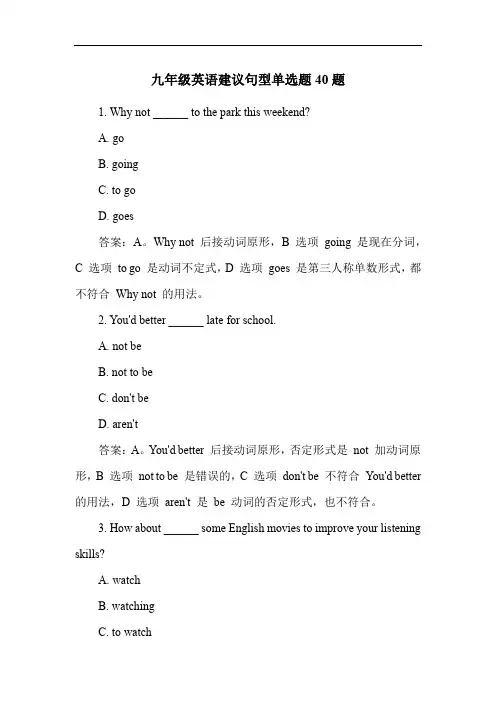
九年级英语建议句型单选题40题1. Why not ______ to the park this weekend?A. goB. goingC. to goD. goes答案:A。
Why not 后接动词原形,B 选项going 是现在分词,C 选项to go 是动词不定式,D 选项goes 是第三人称单数形式,都不符合Why not 的用法。
2. You'd better ______ late for school.A. not beB. not to beC. don't beD. aren't答案:A。
You'd better 后接动词原形,否定形式是not 加动词原形,B 选项not to be 是错误的,C 选项don't be 不符合You'd better 的用法,D 选项aren't 是be 动词的否定形式,也不符合。
3. How about ______ some English movies to improve your listening skills?A. watchB. watchingC. to watchD. watches答案:B。
How about 后接动词的-ing 形式,A 选项watch 是动词原形,C 选项to watch 是动词不定式,D 选项watches 是第三人称单数形式,都不符合How about 的用法。
4. What do you think of ______ a part-time job during the vacation?A. takeB. takingC. to takeD. takes答案:B。
of 是介词,后接动词的-ing 形式,A 选项take 是动词原形,C 选项to take 是动词不定式,D 选项takes 是第三人称单数形式,都不符合of 的用法。
5. It's a good idea ______ English every day.A. to readB. readingC. readD. reads答案:A。
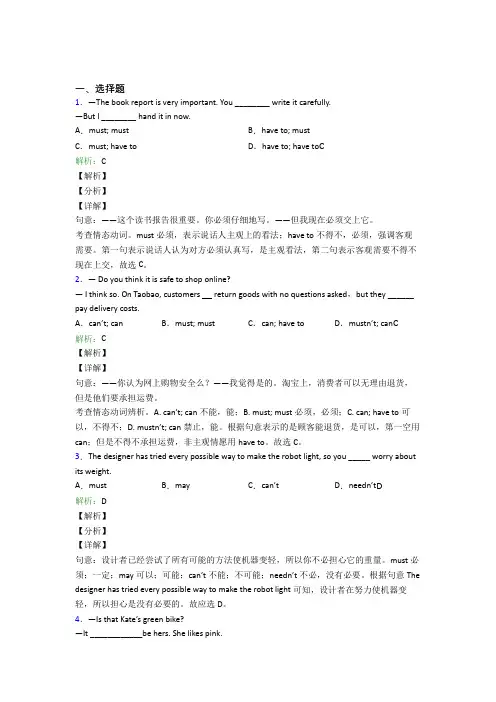
一、选择题1.—The book report is very important. You ________ write it carefully.—But I ________ hand it in now.A.must; must B.have to; mustC.must; have to D.have to; have to C解析:C【解析】【分析】【详解】句意:——这个读书报告很重要。
你必须仔细地写。
——但我现在必须交上它。
考查情态动词。
must必须,表示说话人主观上的看法;have to不得不,必须,强调客观需要。
第一句表示说话人认为对方必须认真写,是主观看法,第二句表示客观需要不得不现在上交,故选C。
2.— Do you think it is safe to shop online?— I think so. On Taobao, customers return goods with no questions asked,but they ______ pay delivery costs.A.can’t; can B.must; must C.can; have to D.mustn’t; can C解析:C【解析】【详解】句意:——你认为网上购物安全么?——我觉得是的。
淘宝上,消费者可以无理由退货,但是他们要承担运费。
考查情态动词辨析。
A. can’t; can不能,能;B. must; must必须,必须;C. can; have to可以,不得不;D. mustn’t; can禁止,能。
根据句意表示的是顾客能退货,是可以,第一空用can;但是不得不承担运费,非主观情愿用have to。
故选C。
3.The designer has tried every possible way to make the robot light, so you _____ worry about its weight.A.must B.may C.can’t D.needn’t D解析:D【解析】【分析】【详解】句意:设计者已经尝试了所有可能的方法使机器变轻,所以你不必担心它的重量。
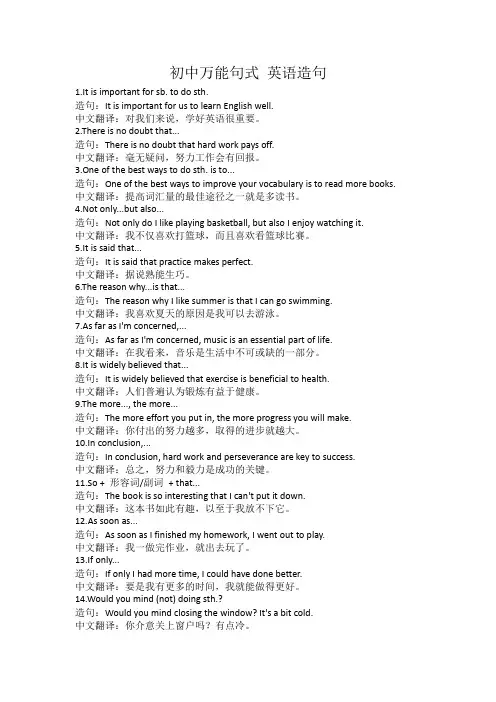
初中万能句式英语造句1.It is important for sb. to do sth.造句:It is important for us to learn English well.中文翻译:对我们来说,学好英语很重要。
2.There is no doubt that...造句:There is no doubt that hard work pays off.中文翻译:毫无疑问,努力工作会有回报。
3.One of the best ways to do sth. is to...造句:One of the best ways to improve your vocabulary is to read more books. 中文翻译:提高词汇量的最佳途径之一就是多读书。
4.Not only...but also...造句:Not only do I like playing basketball, but also I enjoy watching it.中文翻译:我不仅喜欢打篮球,而且喜欢看篮球比赛。
5.It is said that...造句:It is said that practice makes perfect.中文翻译:据说熟能生巧。
6.The reason why...is that...造句:The reason why I like summer is that I can go swimming.中文翻译:我喜欢夏天的原因是我可以去游泳。
7.As far as I'm concerned,...造句:As far as I'm concerned, music is an essential part of life.中文翻译:在我看来,音乐是生活中不可或缺的一部分。
8.It is widely believed that...造句:It is widely believed that exercise is beneficial to health.中文翻译:人们普遍认为锻炼有益于健康。
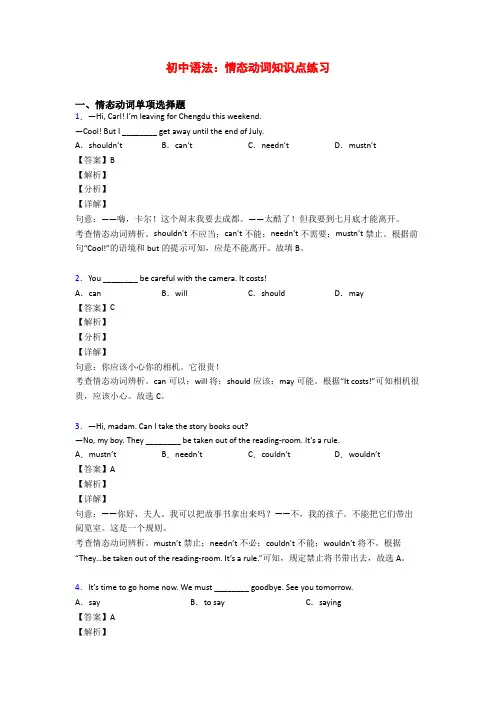
初中语法:情态动词知识点练习一、情态动词单项选择题1.—Hi, Carl! I’m leaving for Chengdu this weekend.—Cool! But I ________ get away until the end of July.A.shouldn’t B.can’t C.needn’t D.mustn’t【答案】B【解析】【分析】【详解】句意:——嗨,卡尔!这个周末我要去成都。
——太酷了!但我要到七月底才能离开。
考查情态动词辨析。
shouldn’t不应当;can’t不能;needn’t不需要;mustn’t禁止。
根据前句“Cool!”的语境和but的提示可知,应是不能离开。
故填B。
2.You ________ be careful with the camera. It costs!A.can B.will C.should D.may【答案】C【解析】【分析】【详解】句意:你应该小心你的相机。
它很贵!考查情态动词辨析。
can可以;will将;should应该;may可能。
根据“It costs!”可知相机很贵,应该小心。
故选C。
3.—Hi, madam. Can I take the story books out?—No, my boy. They ________ be taken out of the reading-room. It’s a rule.A.mustn’t B.needn’t C.couldn’t D.wouldn’t【答案】A【解析】【详解】句意:——你好,夫人。
我可以把故事书拿出来吗?——不,我的孩子。
不能把它们带出阅览室。
这是一个规则。
考查情态动词辨析。
mustn’t禁止;needn’t不必;c ouldn’t不能;wouldn’t将不。
根据“They…be taken out of the reading-room. It’s a rule.”可知,规定禁止将书带出去,故选A。
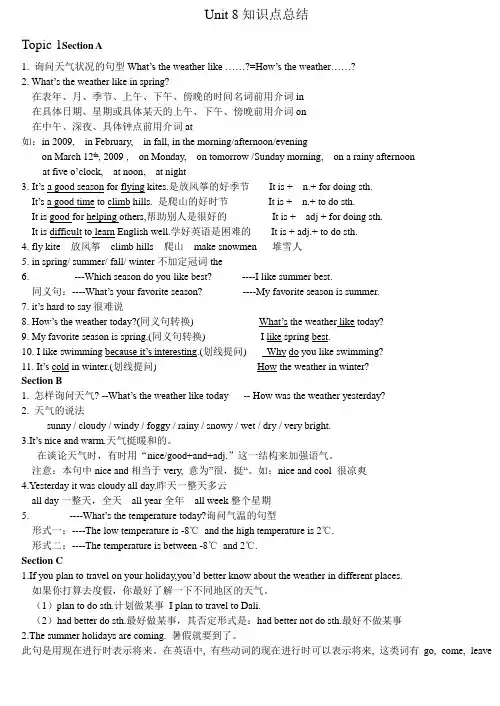
Unit 8知识点总结Topic 1Section A1. 询问天气状况的句型What’s the weather like ……?=How’s the weather……?2. What’s the weather like in spring?在表年、月、季节、上午、下午、傍晚的时间名词前用介词in在具体日期、星期或具体某天的上午、下午、傍晚前用介词on在中午、深夜、具体钟点前用介词at如:in 2009, in February, in fall, in the morning/afternoon/eveningon March 12th, 2009 , on Monday, on tomorrow /Sunday morning, on a rainy afternoonat five o’clock, at noon, at night3.It’s a good season for flying kites.是放风筝的好季节It is + n.+ for doing sth.It’s a good time to climb hills. 是爬山的好时节It is + n.+ to do sth.It is good for helping others,帮助别人是很好的It is + adj + for doing sth.It is difficult to learn English well.学好英语是困难的It is + adj.+ to do sth.4. fly kite 放风筝climb hills 爬山make snowmen 堆雪人5. in spring/ summer/ fall/ winter不加定冠词the6. ---Which season do you like best? ----I like summer best.同义句:----What’s your favorite season? ----My favorite season is summer.7. it’s hard to say很难说8. How’s the weather today?(同义句转换) What’s the weather like today?9. My favorite season is spring.(同义句转换) I like spring best.10. I like swimming because it’s interesting.(划线提问) Why do you like swimming?11. It’s cold in winter.(划线提问) How the weather in winter?Section B1. 怎样询问天气? --What’s the weather like today-- How was the weather yesterday?2. 天气的说法sunny / cloudy / windy / foggy / rainy / snowy / wet / dry / very bright.3.I t’s nice and warm.天气挺暖和的。
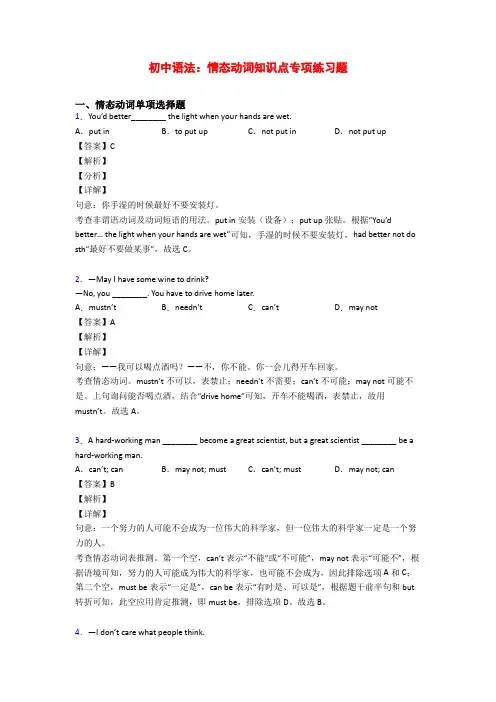
初中语法:情态动词知识点专项练习题一、情态动词单项选择题1.You’d better________ the light when your hands are wet.A.put in B.to put up C.not put in D.not put up【答案】C【解析】【分析】【详解】句意:你手湿的时候最好不要安装灯。
考查非谓语动词及动词短语的用法。
put in安装(设备);put up张贴。
根据“You’d better… the light when your hands are wet”可知,手湿的时候不要安装灯,had better not do sth“最好不要做某事”,故选C。
2.—May I have some wine to drink?—No, you ________. You have to drive home later.A.mustn’t B.needn’t C.can’t D.may not【答案】A【解析】【详解】句意:——我可以喝点酒吗?——不,你不能。
你一会儿得开车回家。
考查情态动词。
mustn’t不可以,表禁止;needn’t不需要;can’t不可能;may not可能不是。
上句询问能否喝点酒,结合“drive home”可知,开车不能喝酒,表禁止,故用mustn’t。
故选A。
3.A hard-working man ________ become a great scientist, but a great scientist ________ be a hard-working man.A.can’t; can B.may not; must C.can’t; must D.may not; can【答案】B【解析】【详解】句意:一个努力的人可能不会成为一位伟大的科学家,但一位伟大的科学家一定是一个努力的人。
考查情态动词表推测。
第一个空,can’t表示“不能”或“不可能”,may not表示“可能不”,根据语境可知,努力的人可能成为伟大的科学家,也可能不会成为,因此排除选项A和C;第二个空,must be表示“一定是”,can be表示“有时是、可以是”,根据题干前半句和but 转折可知,此空应用肯定推测,即must be,排除选项D。
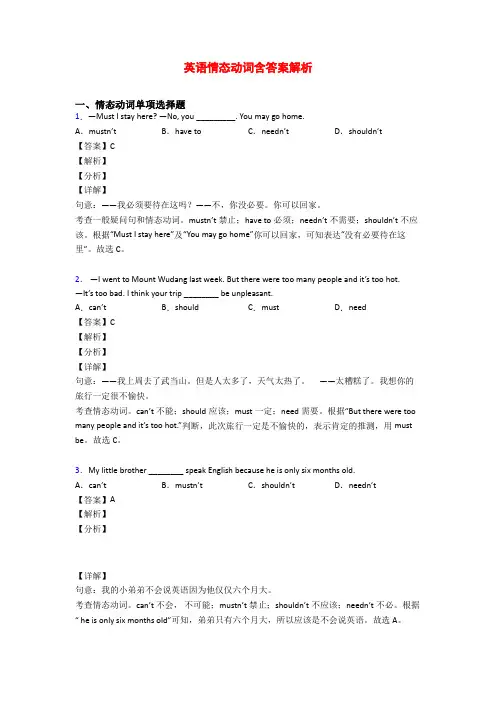
英语情态动词含答案解析一、情态动词单项选择题1.—Must I stay here? —No, you _________. You may go home.A.mustn’t B.have to C.needn’t D.shouldn’t【答案】C【解析】【分析】【详解】句意:——我必须要待在这吗?——不,你没必要。
你可以回家。
考查一般疑问句和情态动词。
mustn’t禁止;have to必须;needn’t不需要;shouldn’t不应该。
根据“Must I stay here”及“You may go home”你可以回家,可知表达“没有必要待在这里”。
故选C。
2.—I went to Mount Wudang last week. But there were too many people and it’s too hot.—It’s too bad. I think your trip ________ be unpleasant.A.can’t B.should C.must D.need【答案】C【解析】【分析】【详解】句意:——我上周去了武当山。
但是人太多了,天气太热了。
——太糟糕了。
我想你的旅行一定很不愉快。
考查情态动词。
can’t不能;should应该;must一定;need需要。
根据“But there were too many people and it’s too hot.”判断,此次旅行一定是不愉快的,表示肯定的推测,用must be。
故选C。
3.My little brother ________ speak English because he is only six months old.A.can’t B.m ustn’t C.shouldn’t D.needn’t【答案】A【解析】【分析】【详解】句意:我的小弟弟不会说英语因为他仅仅六个月大。
考查情态动词。
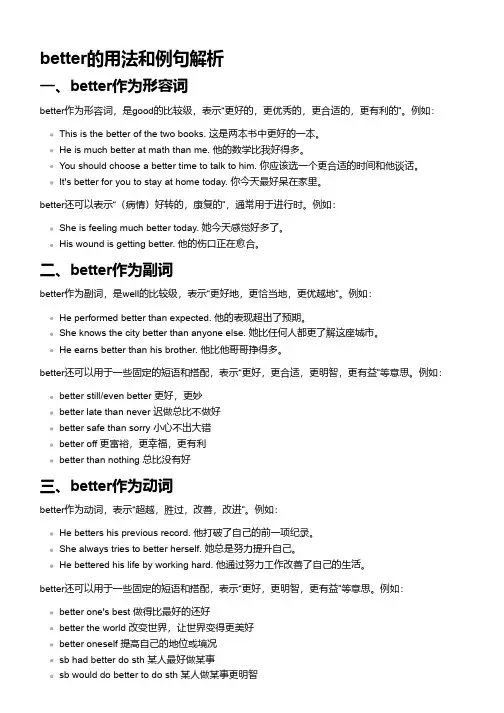
better的用法和例句解析一、better作为形容词better作为形容词,是good的比较级,表示“更好的,更优秀的,更合适的,更有利的”。
例如:This is the better of the two books. 这是两本书中更好的一本。
He is much better at math than me. 他的数学比我好得多。
You should choose a better time to talk to him. 你应该选一个更合适的时间和他谈话。
It's better for you to stay at home today. 你今天最好呆在家里。
better还可以表示“(病情)好转的,康复的”,通常用于进行时。
例如:She is feeling much better today. 她今天感觉好多了。
His wound is getting better. 他的伤口正在愈合。
二、better作为副词better作为副词,是well的比较级,表示“更好地,更恰当地,更优越地”。
例如:He performed better than expected. 他的表现超出了预期。
She knows the city better than anyone else. 她比任何人都更了解这座城市。
He earns better than his brother. 他比他哥哥挣得多。
better还可以用于一些固定的短语和搭配,表示“更好,更合适,更明智,更有益”等意思。
例如:better still/even better 更好,更妙better late than never 迟做总比不做好better safe than sorry 小心不出大错better off 更富裕,更幸福,更有利better than nothing 总比没有好三、better作为动词better作为动词,表示“超越,胜过,改善,改进”。
初二英语情态动词试题答案及解析1.It’s very cold outside. You put on your coat when you go out.A.couldn’t B.can’tC.should D.would【答案】C【解析】句意:外面很冷,你出去的时候应该穿上外套。
A. couldn’t不可能;B. can’t 不能够,不可能;C. should 应该;D. would将要,愿意。
该句表示建议,应该穿上外套。
故选C。
【考点】考查情态动词。
2.–Have you decided where to spend your summer holiday?--Not yet. We _____ go to Hong Kong.A.may B.mustC.should D.need【答案】A【解析】句意:---你已经决定去哪儿度暑假了吗?---还没有。
我们或许去香港。
肯定句中表把握性不太大的推测用may,故选A。
【考点】考查情态动词的用法。
3. We _______ play on this road. There is too much traffic.A.must B.mustn’t C.need D.needn’t【答案】B【解析】句意:我们千万不要在马路上玩耍。
有太多的车。
这里表达的是禁止做某事,情态动词mustn’t。
故选B.【考点】考查情态动词的用法。
4.—______ you help me mend the radio?—Yes, I can.A.May B.Might C.Must D.Can【答案】D【解析】句意:你能帮我修理这台收音机吗?是的,我能。
A May表示可以BMight表示可以是May的过去式Cmust表示必须Dcan表示能。
根据句意故选D。
【考点】考查情态动词。
5.–Must I return the story book tomorrow, madam?–No, you ______ bring it here next Monday.A.may B.must C.mustn’t D.maybe【答案】A【解析】句意:我必须明天归还故事书吗夫人?不,你可以下周一带来。
高考英语听力高频词汇高考考试的对话内容场景基本上都是考生所熟悉的,有校园、生活、工作、各种社交场所。
了解一些场景下的常用语和常见表达对解题是很有帮助的。
对这些常用词汇和短语不仅要知道其本身的意思,还要知道它们的同义表达方式。
这是因为现在听力试题一般不会在选项中出现对话中的原词和词组。
以下场景是对话当中所占比例最大的,掌握了这些场景下的常用短语和表达方式,也就从词汇和短语方面抓住了解题的关键。
(1)餐馆场景:order 点菜serve 上菜change 零钱Keep the change! 不用找零钱了!tip 小费treat 请客(This is my treat! 我请客!)go Dutch AA制(Let’s go fifty fifty. )steak 牛排cheese奶酪sandwich 三明治bacon 腌肉soup 汤plain water 自来水(西餐中洗手用的)doughnut 甜甜圈appetizer 开胃物dessert甜品,水果(作为正餐的最后一道)go out for dinner / dinner out 出去吃饭snack bar 小吃街;大排挡hamburger 汉堡包coke 可口可乐French fries 炸薯条dining hall 餐厅;食堂coffee shop 咖啡店restaurant 餐馆cafeteria 自助餐厅canteen 食堂buffet 自助餐(2)邮局场景:stamp 邮票envelope 信封package / parcel 包裹overweight 超重extra postage 额外邮资send / post / deliver a letter / mail 寄/发信express mail 快件airmail 航空信件surface mail 陆地邮寄open an account 开一个帐户(3)图书馆场景:library card 借书证borrow 借入lend 借出keep 保留renew 更新bookshelf 书架novel 小说science fiction科幻小说magazine 杂志periodical期刊reference book 参考书librarian 图书管理员pay a fine 交罚款(4)医院及健康场景:aspirin 阿司匹林(止痛药)regular doctor 私人医生emergence department 急诊室ICU(= intensive care unit)特护病房treatment 治疗手段take one’s temperature 测量体温blood pressure 血压medicine 药pills / tablets药丸/药片heart attack 心脏病cold / flu 流感have/catch a cold 患上感冒pain 疼痛headache 头痛stomach-ache 胃痛backache 背痛sore-throat喉咙痛cough 咳嗽fever 发烧What’s up? 你好吗?(多用于男生之间)How is it going?= How are you? 你好吗?/怎么样?I’m fine. / I feel good/terrific. / I couldn’t be better. / Nothing is very wrong with me. 好。
八上unit4知识点总结一、重要单词梳理:1、repair = fix (repair 更正式) 修理2、instead of doing sth 代替做某事,而不是做某事instead 反而(用于句首或句末,放句首时后面加逗号)3、put in 安装put on 穿上,表演put off 推迟put up 张贴、搭建、举起put out 扑灭4、fill……with…… 用……填充be filled with……=be full of 充满……5、shelf---(复数)shelves6、advise sb to do sth 建议某人去做某事7、“例如” for example 使用时后面加逗号,通常后面接一个例子such as 使用时后面不加逗号,通常后面接多个例子8、leave “离开“/”留下,落下“/”使处于某种状态“9、be certain/sure to do sth 确定/肯定做某事be certain/sure about doing sth 对做……有把握be certain/sure that…… 确定……10、tidy up 收拾,整理tidy sth up 收拾好整理好某物11、cut out 剪出、删除cut in 插嘴cut off 剪断、中断cut up 切碎cut down 砍倒、削减12、complete/finish doing sth 完成做某事13、fuiniture “家具”是(不可数)名词二、重要短语:1、stand for 代表,象征2、be crazy about ……对…着迷3、make a mistake=make mistakes 犯错误4、power cut 停电5、not only…but (also)…不仅…而且…6、go wrong 弄错,(机器)出故障7、Keep it secret=keep a secret=keep secrets 保密8、tomato sauce 番茄酱9、look terrible 看起来糟糕/可怕10、a pair of scissors 一把剪刀11、take a course in sth 学/修……课12、a piece of bread 一片面包13、know much more about sth 对……了解的多得多14、outdoor sports 户外运动三、重要用法总结:1、pay sb to do sth 付钱给某人去做某事2、paint sth+颜色把某物粉刷成…颜色(通常用颜料/涂料)colour sth+颜色给某物着色/上色3、keep( on )doing sth 继续/一直做某事4、stop doing sth (停止正在做的事)Stop to do sth (停止正在做的事,去做另一件事)5、decide to do sth 决定去做某事6、have fun/ have a good time doing sth 开心做某事have sth to do 有某事去做7、honest诚实的---dishonest不诚实的tidy 整洁的---untidy 不整洁的happy 开心的---unhappy 不开心的certain 确定的---uncertain 不确定的comfortable舒服的---uncomfortable不舒服的important 重要的---unimportant 不重要的polite 礼貌的---impolite 不礼貌的patient 耐心的---impatient 没有耐心的active 积极的活跃的---inactive 不积极不活跃的correct 正确的---incorrect 不正确的四、重点语法:1、祈使句:表示要求、建议、命令的句子。
情态动词练习题一、情态动词单项选择题1.We ________ try our best to fight against pollution.A.should B.may C.mustn’t D.needn’t【答案】A【解析】【详解】句意:我们应该尽力与污染作斗争。
考查情态动词辨析。
should应该;may也许;mustn’t禁止;needn’t不必。
分析“We…try our best to fight against pollution.”可知,此处强调义务,“应该”符合语境,故选A。
2.— Do we have to leave for the station at once?— No, we _________. There is plenty of time before the train starts.A.mustn’t B.needn’t C.can’t D.shouldn’t【答案】B【解析】【详解】句意:——我们必须马上动身去车站吗?——不,我们不需要。
火车开动前还有很多时间。
考查情态动词的用法。
mustn’t一定不要,禁止;needn’t不需要;can’t不能;shouldn’t不应该。
根据后文“There is plenty of time before the train starts”以及答语“No”可知,没必要马上动身去车站。
故选B。
3.You look quite tired. You’d better _______ a rest.A.stop to have B.to stop to have C.stop having D.to stop having【答案】A【解析】【详解】句意:你看起来很累。
你最好停下来休息一下。
考查情态动词后接动词原形以及非谓语动词。
had better do sth“最好做某事”。
stop doing sth 停下正在做的事情;stop to do sth停下来去做某事。
1.of great importance =very important非常重要的 2.in our life 在我们的生活中 3.just as a saying goes俗话说得好 4.Health is more worth than wealth.健康胜过财富。 5.keep healthy保持健康 6.a good diet 一个好的饮食习惯 7.quite necessary 十分必要 8.good health良好的健康 9.therefore因此 10.had better do sth.最好做某事 11.nutritious food 有营养的食物 12.junk food垃圾食品 13.taking enough exercise or sports做足够的运动 14.is helpful for 有利于 15.choose to do sth.选择去做某事 16.do much good to sth.有益 17.what's more而且 18.good attitude to life and others 对生活和他人有良好的态度 19.be beneficial to sth. 有益于什么 20.be optimistic乐观的 21.generous慷慨的 22.helpful乐于助人的 23.warm-hearted 热心的 24.feel pleasant and content with life and others 对生活和他人感到愉快和满足 25.in short = in a word 26.there are many ways of doing sth. 做某事有很多方法 27.only by doing sth.只有通过做某事 28.stick on doing sth.坚持做某事 29.day after day 一天又一天 30.keep sb. healthy forever使某人永远保持健康 1.of great importance =very important非常重要的 2.in our life 在我们的生活中 3.just as a saying goes俗话说得好 4.Health is more worth than wealth.健康胜过财富。 5.keep healthy保持健康 6.a good diet 一个好的饮食习惯 7.quite necessary 十分必要 8.good health良好的健康 9.therefore因此 10.had better do sth.最好做某事 11.nutritious food 有营养的食物 12.junk food垃圾食品 13.taking enough exercise or sports做足够的运动 14.is helpful for 有利于 15.choose to do sth.选择去做某事 16.do much good to sth.有益 17.what's more而且 18.good attitude to life and others 对生活和他人有良好的态度 19.be beneficial to sth. 有益于什么 20.be optimistic乐观的 21.generous慷慨的 22.helpful乐于助人的 23.warm-hearted 热心的 24.feel pleasant and content with life and others 对生活和他人感到愉快和满足 25.in short = in a word 26.there are many ways of doing sth. 做某事有很多方法 27.only by doing sth.只有通过做某事 28.stick on doing sth.坚持做某事 29.day after day 一天又一天 30.keep sb. healthy forever使某人永远保持健康
表示提建议的英语句型:一、动词原形类1. Let sb. do sth. 让某人做......举例:①Let's go swimming. 让我们去游泳吧。
②Let them clean the classroom. 让他们打扫教室。
③Let Tom wash his clothes by himself. 让Tom自己洗衣服。
注意:①Let's=Let us②Let sb. do sth. 属于祈使句里重要句型之一。
③根据动宾结构,let后加人称代词时,要用宾格。
2. Why not do sth.? =Why don't you/we do sth.? 为什么不做某事?举例:①Why not go swimming? 为什么不去游泳呢?②Why don't you have a rest? 你为什么不休息一下呢?注意:①Why not 直接加动词原形,没有人称主语。
②加入助动词否定式don't,不要漏了人称主语,常用you /we。
3. Shall I/we do sth.?我们可以做......?举例:①Shall I open the door? 我可以开门吗?②Shall we have supper with you? 我们可以和你吃晚饭吗?注意:①shall表示建议或请求语气的程度,较委婉,不要翻译为应该。
②shall常用第一人称I/we。
4. You had better do sth. = You'd better do sth. 你最好做......举例:①Tom had better have a rest. Tom最好去休息一下。
②You'd better not sleep. 你最好不要睡觉。
注意:①You had=You'd, had better没有人称、时态、数的变化。
②had better do sth. 否定是had better not do sth. 最好不要做某事。
had better do sth最好做某事make sb do sth let sb do sth 让某人做某事
why not =why don’t do为什么不?Would you please do sth?
vwant, , decide, , forget, , ask tell afford, , try would like It’s +adj. + to do sth. mind, enjoy, finish, practise, consider, give up, go + doingkeep 继续Thank you for doing sth. .be good at doing sth. do well in doing sth. How/What about doing sth.?
see, watch, hear, feel, notice
2. You’d better _____ upstairs and tell the children_____ make so much noise.
A. go; not to
B. g o; don’t
C. to go; not to
D. to go; don’t
4. It’s too late. Why _____ now?(1999新疆)
A. not to go
B. not going
C. not go
D. don’t go
5. Please don’t forget _____ to me, will you?(1998重庆)
A. to write
B. writing
C. write
6. When I’m tired, I enjoy _____ music.(1999云南)
A. listening
B. listening to
C. to hear
D. hearing the
9. The Great Green Wall will stop the wind from _____ the earth away. (1998辽宁)
A. blow
B. to blow
C. blowing
D. Blew
13. _____ is bad for our health.(1997河南)
A. Doing eye exercises
B. Go to bed early
C. Eating too much
D. Taking a walk
14. Wu Dong is good at _____ English.(1997吉林)
A. speak
B. speaks
C. speaking
D. Spoke
You’d better _____ the cinema by bus.
A. don’t go
B. to go
C. to go to
D. go to
11. Mary went _____ after she finished _____ her work.
. swim; doingB. to swim; to doC. to swim; doingD. swimming; to do
12. Would you mind _____ the window, please? It’s cold outside.
A. to close
B. closing
C. closed
D. Close
---- I usually go there by train.
---- Why not ___ by boat for a change?
A. to try going
B.trying to go
C.to try and go
D.try going
1. Linda ate nothing this morning, ___?
A. didn’t she
B. was she
C. did she
D. wasn’t she
10. My uncle has never been to a foreign country, _________?
(A) has he (B) does he (C) hasn't he (D) doesn't he
11. He can’t be her father, _____ he?
A. is
B. isn’t
C. can
D. can’t
1.You have few friends ,____ ____ ?
A: have you B: do you C: don’t you
23. Let’s go there by bus, ___?
A. will you
B. shall we
C. don’t you
D. will you
24. Let us go to play football, ___?
A. will you
B. shall we
C. do we
D. are we
30. There is little water in the glass, ____?
A. isn’t there
B. isn’t it
C. is it
D. is there
二、选择填空。
1. _______ fast the boy ran!
A. How
B. How an
C. What
D. What an
3. ________ delicious the soup is! I’d like some more.
A. How
B. How an
C. What
D. What an
3. ____ interesting the film is!(1998湖北)
A. What
B. What an
C. How
D. How a
( )4. ____ sunny day! Let’s go out for a walk.(1999江西)
A. How a
B. How
C. What a
D. What
( )5. ____ hard work it is!(1999浙江)
A. How
B. What
C. What a
D. What an
5 ___________ it is today!
A How cold
B What cold
C How a cold
D What a cold
6 ___________bad the weather is!
A How
B What
C What a
D How a
写作题
我最好的朋友。